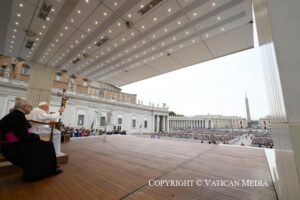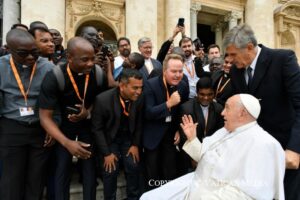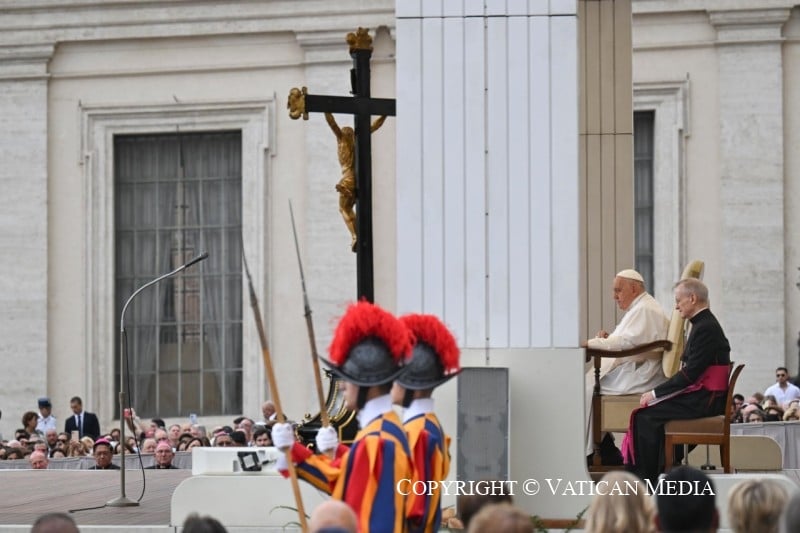This morning’s General Audience took place at 9:00 a.m. in St. Peter’s Square.
In his address in Italian, the Pope, resuming the cycle of catechesis Passion for Evangelization: the apostolic zeal of the believer, focused his meditation on the theme “Saint Daniele Comboni, apostle for Africa and prophet of the mission” (Reading: 1 Thess 2:4, 7b-8).
After summarizing His catechesis in the different languages, the Holy Father addressed special expressions of greeting to the faithful present. He then appealed to the international community to make every effort to find peace solutions in the South Caucasus.
The General Audience ended with the recitation of the Pater Noster and the Apostolic Blessing.
Catechesis. Passion for evangelization: the apostolic zeal of the believer. 21. St. Daniel Comboni, apostle for Africa and prophet of the mission
Catechesis. The passion for evangelization: the apostolic zeal of the believer. 21. Saint Daniel Comboni, apostole for Africa and a prophet of mission
Dear brothers and sisters, good morning!

He affirmed this in a context characterized by the horror of slavery, of which he was a witness. Slavery “objectifies” the human being, whose value is reduced to being useful to someone or something. But Jesus, God made man, elevated the dignity of every human being and exposed the falsity of every slavery. In the light of Christ, Comboni became aware of the evil of slavery. Moreover, he understood that social slavery is rooted in an even deeper slavery, that of the heart, that of sin, from which the Lord frees us. As Christians, therefore, we are called to fight every form of slavery. Unfortunately, however, slavery, like colonialism, is not something from the past, unfortunately. In the Africa that Comboni loved so much, which is today torn by so many conflicts, “political exploitation gave way to an ‘economic colonialism’ that was equally enslaving. (…) This is a tragedy to which the economically more advanced world often closes its eyes, ears and mouth”. I therefore renew my appeal: “Stop choking Africa: it is not a mine to be stripped or a terrain to be plundered” (Meeting with Authorities, Kinshasa, 31 January 2023).
And going back to the life of Saint Daniel. After the first period spent in Africa, he had to leave the mission due to health reasons. Too many missionaries had died after contracting malaria, complicated by insufficient awareness of the local situation. Though others abandoned Africa, Comboni did not do so. After a period of discernment, he felt the Lord was inspiring him along a new path of evangelization, which he summed up in these words: “Save Africa with Africa” (Writings, 2741s). This was a powerful insight, devoid of colonialism. It was a powerful insight that helped renew his missionary outreach: the people who had been evangelized were not only “objects”, but “subjects” of mission. And Saint Daniel Comboni wanted every Christian to participte in the evangelizing enterprise. With this spirit, he integrated his thoughts and actions, involving the local clergy and promoting the lay service of catechist. Catechists are a treasure in the Church. Catechists are those who bring evangelization forward. He also conceived of human development in this way, cultivating the arts and professions, fostering the role of the family and of women in the transformation of culture and society. And how important it is, even today, to make the faith and human development progress within the context of mission, rather than transplant external models or limit them to sterile welfarism! Neither external models nor welfarism. To take the path of evangelization from the culture, from the people’s culture. To evangelize the culture and to inculturate the Gospel go together.
Comboni’s great missionary passion, however, was not primarily the fruit of human endeavor. He was not driven by his own courage or motivated solely by important values such as freedom, justice and peace. His zeal came from the joy of the Gospel, drawn from Christ’s love which then led to love of Christ! Saint Daniel wrote, “Such an arduous and laborious mission as ours cannot be glossed over, lived by crooked-necked people filled with egoism and with themselves, who do not care for their health and the conversion of souls as they should”. This is the tragedy of clericalism which leads Christians, laity included, to clericalize themselves and to transform themselves – as it says here – into people with crooked necks filled with egoism. This is the plague of clericalism. And he added, “It is necessary to inflame them with charity that has its source from God and the love of Christ; when one truly loves Christ, then privations, sufferings and martyrdom become sweet” (Writings, 6656). He desired to see ardent, joyful, dedicated missionaries, “holy and capable” missionaries, he wrote, “first of all saints, that is, completely free from sin and offence to God and humble. But this is not enough: we need charity that enables our subjects” (Writings, 6655). For Comboni, the source of missionary ability, therefore, is charity, in particular, the zeal by which he made the sufferings of others his own.
In addition, his passion for evangelization never led him to act as a soloist, but always in communion, in the Church. “I have but one life to offer for the salvation of those souls: I wish I had a thousand to be consumed for this end” (Writings, 2271).
Brothers and sisters, Saint Daniel testifies to the love of the Good Shepherd who goes in search of the one who is lost and gives his life for the flock. His zeal was energetic and prophetic in being opposed to indifference and exclusion. In his letters, he earnestly called out his beloved Church who had forgotten Africa for too long. Comboni’s dream is that of a Church who makes common cause with those who are crucified in history, so as to experience the resurrection with them. At this moment, I would like to offer all of you a suggestion. Think of those who are crucified in today’s history: men, women, children, the elderly, all those who are crucified by the history of injustice and domination. Let us think of them and let us pray for them. His witness seems to want to repeat to all of us, men and women of the Church: “Do not forget the poor – love them – for Jesus crucified is present in them, waiting to rise again”. Let us not forget the poor. Before coming here, I had a meeting with Brazilian legislators who are working for the poor, who try to promote the poor through assistance and social justice. And they do not forget the poor – they work for the poor. To all of you, I say: do not forget the poor, because they will be the ones who will open the door of Heaven for you. Thank you.
__________________________________________
APPEAL
Yesterday, I heard the disturbing news from Nagorno Karabakh, in the Southern Caucasus, where the already critical humanitarian situation is now aggravated by additional armed clashes. I extend my heartfelt appeal to all involved and to the international community that the weapons be silenced and that every effort be made to find peaceful solutions for the good of the people and respect for human dignity.
__________________________________________

I extend a warm welcome to the English-speaking pilgrims and visitors taking part in today’s Audience, especially the groups from Denmark, Norway, Cameroon, Australia, India, Indonesia, Malaysia, the Philippines and the United States of America. Upon you and your families I invoke the joy and peace of our Lord Jesus Christ. God bless you all!
____________________________
Summary of the Holy Father’s words
Dear brothers and sisters: In our catechesis on apostolic zeal, we have been reflecting on the spread of the Gospel through the witness of men and women of every time and place. Today we turn to Africa and the prophetic missionary vision of Saint Daniel Comboni, centred on the liberating power of the Gospel. In a social context marked by the evil of slavery, Daniel Comboni preached Christ, crucified and risen, as the source of authentic freedom, not only from sin but from every form of enslavement that debases our human dignity. Ahead of his time, he recognized the need for an integral evangelization involving local clergy, catechists and lay leaders, grounded in the Gospel message and its summons to the building of a just, solidary and humane social order. For Saint Daniel Comboni, Christian charity, manifested in our solidarity with those who suffer, is the ultimate inspiration and driving force behind all missionary outreach. May his love of the Church, his commitment to her universal mission, and his pastoral concern for the future of the peoples of Africa continue to inspire the evangelizing efforts of the Church in our own time.










